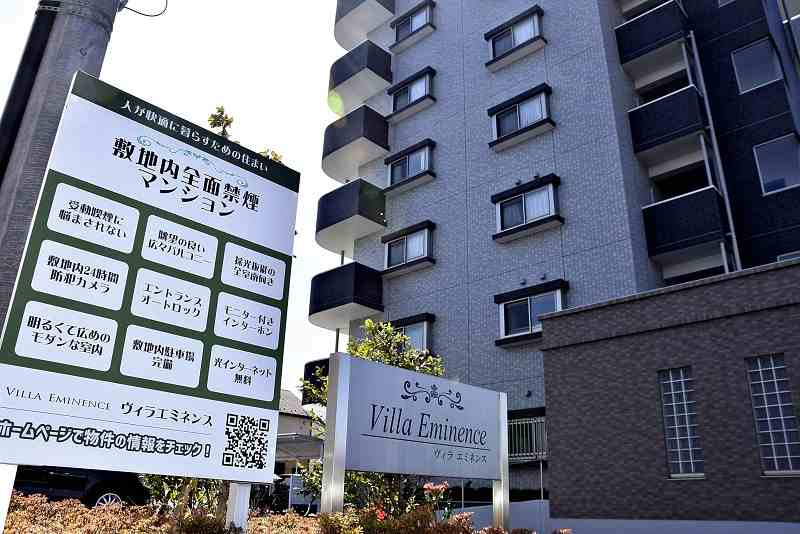
Villa Eminence, a rental condominium in Maebashi that prohibits smoking on the premises.
15:30 JST, April 10, 2021
Condominiums and apartments that prohibit smoking on the premises are becoming more popular. As people stay home more because of the COVID-19 pandemic, demand for places that allow renters to not worry about smoking-related problems with neighbors is likely to increase even more.
“I’m happy because I don’t have to worry about cigarette smoke,” said a woman in her 30s who started renting a condominium in Maebashi in May last year.
Compliance with the nonsmoking rules is included in the rental agreement for the property, where smoking is banned on the entire premises, which includes 21 units.
In her previous apartment, she used to smell her neighbor’s cigarettes when they smoked on the balcony and the smell would stick to her clothes as they hung to dry. She also had to keep her windows closed to prevent the smoke from coming into her room. As a result of these issues, she decided to move to her current place, which was built five years ago.
“I was worried that a lot of the rooms would be left vacant,” said the 67-year-old owner of the condominium. “But a lot of people were interested, saying they wanted to live there because of the nonsmoking policy.”
Expenses for signs that notified residents about the nonsmoking policy were about the only extra cost he had to shoulder.
One of two buildings of a rental condominium complex in Setagaya Ward, Tokyo, also prohibits smoking on the premises.
In January, Tokyo Metropolitan Housing Supply Corp. started accepting lease applications for the condominium complex. The company received 11.3 times more applications than there were rooms for the nonsmoking building.
As the number of smokers nationwide has decreased to less than 20% of the adult population, nonsmoking rentals are gradually increasing. Kinenmansion.com, a Japanese-language website that only lists condominiums with nonsmoking policies, always has information on more than 1,000 rentals.
Attempting to change existing rentals from smoking to nonsmoking can be a difficult challenge when there are current residents who are smokers. As a result, the nonsmoking policy is often established when new rentals are constructed.
“There are still not that many nonsmoking rentals nationwide, but there is definitely a demand for them,” said Takamitsu Isoda, the president of the company operating the website.
Nonsmoking rentals are also a plus for their owners as well because the walls are less likely to be stained and the risk of a house fire is lower.
As the pandemic is forcing people to stay home longer, Tokyo-based marketing research company Pile-up conducted a survey in April last year asking 1,600 people — smokers and their families — where they smoke while at home.
“The balcony or garden” was the most common at 42%, followed by “near the ventilation fan (indoors)” at 29%. As smoking may cause problems with neighbors, demand for nonsmoking rentals is likely to increase.
But what can a person do when they are having issues with a neighbor who smokes cigarettes?
“Balconies and corridors of multi-family residences are shared spaces, so there are restrictions for their use,” said Ritsu Katayama, lawyer and a board member of Japan Society for Tobacco Control. “You should ask the building’s management company to speak with the neighbor about the issue.”
Top Articles in Society
-

Man Infected with Measles Reportedly Dined at Restaurant in Tokyo Station
-

Man Infected with Measles May Have Come in Contact with Many People in Tokyo, Went to Store, Restaurant Around When Symptoms Emerged
-

Woman with Measles Visited Hospital in Tokyo Multiple Times Before Being Diagnosed with Disease
-

Australian Woman Dies After Mishap on Ski Lift in Nagano Prefecture
-

Foreign Snowboarder in Serious Condition After Hanging in Midair from Chairlift in Nagano Prefecture
JN ACCESS RANKING
-

Japan PM Takaichi’s Cabinet Resigns en Masse
-

Japan Institute to Use Domestic Commercial Optical Lattice Clock to Set Japan Standard Time
-

Israeli Ambassador to Japan Speaks about Japan’s Role in the Reconstruction of Gaza
-

Man Infected with Measles Reportedly Dined at Restaurant in Tokyo Station
-

Videos Plagiarized, Reposted with False Subtitles Claiming ‘Ryukyu Belongs to China’; Anti-China False Information Also Posted in Japan




















